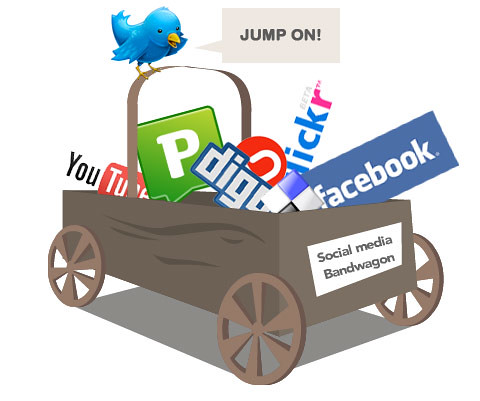Social Media sites are kinda the double edged sword for educators. We have already covered using them as a personal learning tool - so I'll put that aside. Using them with students in the classroom can be a bit more of an issue. Not only is it difficult to control content when using some of the larger mass social media sites, but teachers have to be careful not to 'cross the line' with regards to their students. Having them as 'friends' on Twitter or Facebook can open up several difficulties. First of all teachers have to make sure that their own content is very professional - thats easy enough though just make a professional account and keep it clean. More difficult is making sure that your students don't inadvertantly show 'you' the teacher incriminating content. Seeing a number of your students engaging in dangerous or illegal activities will not can put you in an almost impossible situation. If you don't say anything you could be disciplined or fired depending on the circumstances, but if you 'rat' on your students you may loose their confidence and trust - not a situation you wanna be in.
It's unfortunate because using Twitter or other sites could be very possitive. Honestly the suggestion to use sites such as classroom websites, blogs etc would be the safesty way of connecting with student and giving them a place to discuss or access resources online. That being said it may still be possible to use means such as Twitter - maybe you can get students to set up their own 'school' Twitter accounts and encourage them to keep the content clean - you could even explain that you also have 'professional' accounts online and therefore role model how professionals use the internet responsibly. You could also connect this with discussions on the longevity of what goes onto the internet (the fact that it never really ever leaves!) and awaken them to the fact that what they post today could come back and bite them tomorrow.

i agree with you TIm. I can see there defnitely being students that will take advantage of social networking and it can put the teacher in a difficult situation. I think its our job as educators to teach proper internet ettiquette, and that students and people i general need to realize that if they wouldnt say it in public, then its probably a good idea not to say it "online". its treated the same ways now a days.
ReplyDeleteGood points made there Tim. As I was reading your post, I was reminded of an example I stumbled upon of a use for Twitter - http://www.readwriteweb.com/archives/how_one_teacher_uses_twitter_in_the_classroom.php. In this case, Twitter was used as sort of a discussion forum for students on topics covered in a university class. The idea could be incorporated into high schools as well.
ReplyDeleteEspecially in large classes, some students are reluctant to speak up in class and/or ask questions. By using Twitter or another social medium, we can give those shy students more opportunity to communicate with the teacher and fellow classmates. I like the idea of that.
Hey Tim, I think you did a good job identifying all the major concerns teachers may have with using websites like Twitter and Facebook, and having students as friends.
ReplyDeleteI think it's a great idea to have a "professional" facebook page... one that is specifically used to get in touch with students, post professional work-related articles, etc.
Cheers
I am kind of on the fence with creating a professional account or befriending students on facebook. I want to believe that a person going into teaching is competent enough to think about the comments they make and the pictures they upload from a students point of view. I also think that befriending students online is a great way to model how to use social media and create accountability for students. Although it is a free country and teachers can partake in whatever activities suit they fancy, they also have a reputation to uphold as an individual, and as a teacher in the community. If they cannot handle this responsibility, then they should have to deal with the consequences. I sometimes think that instead of hiding behind a professional account, teachers become more real to students and this creates a culture of respect.
ReplyDeleteI understand what you are saying shaun but sometimes its not just what 'you' put up on your facebook account - but what other people who you have as friends put up. You can't control it and unless you want to remove everyone that you know might put some silly remark on your wall as a friend then you run the risk of having some student reading it and then reporting it. In addition its not always a good thing for students to know everything about you that you share with your adult friends - I think teachers have to make real connections with their students - but those connects should not be the same as the ones that you should be making with friends and family your own age.
ReplyDelete